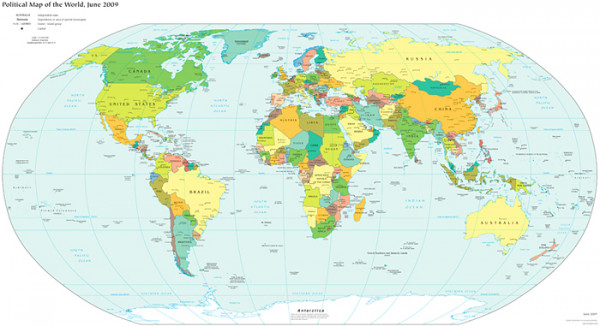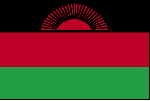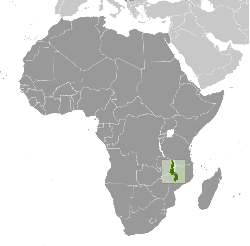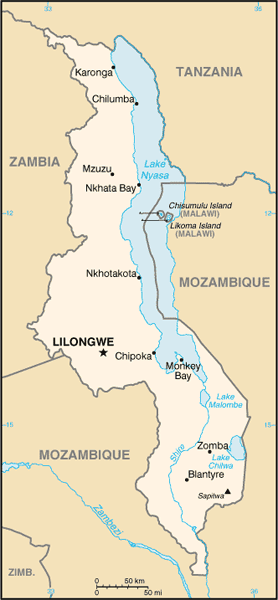Malawi
Overview
| Flag |
|
| Anthem |
Mulungu dalitsa Malaŵi (Oh God Bless Our Land of Malawi) |
| Capital |
Lilongwe |
| Largest city |
Blantyre |
| Official language(s) |
English |
Demonyma name for a resident of a locality, often the same as the name of the people's native language
|
Malawian |
| Government |
Multi-party democracy |
| Area |
118,484 km2, 45,747 sq mi |
| Population |
~ 15 million |
| Currency |
Kwacha (D) (MWK) |
| Internet TLD |
.mw |
Geography
Malawi is a
landlockeda term used to refer to a region, especially a country, that does not border the sea country in southeast Africa that was formerly known as Nyasaland. It is bordered by Zambia to the northwest, Tanzania to the northeast, and Mozambique on the east, south and west. The country is separated from Tanzania and Mozambique by Lake Malawi.
Malawi's capital and largest city is Lilongwe with an estimated population of 902,388. Its second largest city is Blantyre and the third largest city is Mzuzu.
Society and culture
Malawi was an English
colonya region or governmental unit created by another country and generally ruled by another country until 1964. Today, the country has a culture combining native and colonial aspects, including sports, art, dance and music.
Population
Malawi has a population of over 15 million. This population is made up of the Chewa, Nyanja, Tumbuka, Yao, Lomwe, Sena, Tonga, Ngoni and Ngonde native ethnic groups, as well as populations of Asians and Europeans.
Languages
There are two official languages in Malawi: English and Chichewa. Chichewa is spoken by over 57% of the population. Other major languages include Chinyanja (12.8%), Chiyao (10.1%) and Chitumbuka (9.5%).
Religion
As of 2007, approximately 80% of the population is estimated to be Christian. The Roman Catholic Church and the Church of Central Africa make up the largest Christian groups. There are also smaller numbers of Anglicans, Baptists, Evangelicals and Seventh-day Adventists in the country. Around 13% of the population is Muslim.
Atheistspeople who lack belief in the existence of any god make up around 4% of the population.
Government and politics
Malawi is a democratic, multi-party government. The country is currently under the leadership of President Bingu wa Mutharika. He is both chief of state and head of government. The branches of the government consist of executive, legislative and judicial. The
executivethe branch of government which is responsible for enforcing laws and judicial decisions, and for the day-to-day running of the state includes the president, first and second vice presidents and a
cabinetthe group of ministers responsible for creating government policy and for overseeing the departments comprising the executive branch. The
legislativemaking, or having the power to make, a law branch consists of a
unicameralhaving a single legislative chamber National Assembly. The independent
judicial branchthe branch of government which is responsible for maintaining the courts of law and for the administration of justice is based upon the English model and consists of a constitutional court, a High Court, a Supreme Court of Appeal and subordinate Magistrate Courts.
Economy
Malawi is among the world's least developed and most
densely populatedmany people living in an area countries. The economy is mainly based on agriculture. Around 85% of the population live in rural areas. More than 90% of export
revenuesthe total income received from a given source come from agriculture. The economy of Malawi has in the past been dependent on economic
aidhelp and assistance from the World Bank, the International Monetary Fund (IMF) and individual nations.







